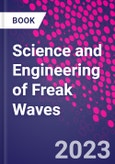Science and Engineering of Freak Waves provides a holistic and interdisciplinary view of extreme ocean waves for both scientific and engineering applications. Readers will learn the fundamental theory of extreme waves and the implications they have on coastal structures and methods of prediction through chapters that review the definitions of extreme waves, their history and other important observations. After this, the book's authors describe the theory and modeling of extreme waves that occur in various situations. Final sections provide examples of the application of extreme wave research results to various engineering designs are presented.
This book provides a comprehensive overview of the current status of our understandings on freak/rogue waves, the science of extreme waves, prediction, and their engineering applications. As such, it is a must read for physical oceanographers looking for a better understanding of prediction models and the history of these waves, and engineers looking for more information on preparedness and implications for offshore structures and shipping.
Please Note: This is an On Demand product, delivery may take up to 11 working days after payment has been received.
Table of Contents
1. What is a rogue/freak wave? 2. History of extreme wave research in science and engineering 3. Measurements 1 4. Measurements 2 5. Mechanism 1: Nonlinear wave interactions 6. Mechanism 2: Crossing waves 7. Mechanism 3: Wave, current and bathymetry interactions 8. Prediction 1: Short-term prediction of extreme waves 9. Prediction 2: Long-term prediction of extreme waves 10. Application 1: Extreme waves; ships and offshore platforms 11. Application 2: Shipping and offshore industry 12. Application 3: Extreme waves and coastal structures 13. Application 4: Interdisciplinary impact NomenclatureAuthors
Nobuhito Mori Disaster Prevention Research Institute, Kyoto University, Japan. Nobuhito Mori is currently the Deputy director of the Disaster Prevention Research Institute at Kyoto University, Japan and also an Honorary Professor at Swansea University, UK. He received his PHD from Gifu University, Japan in 1996 and since then has had several posts at leading institutes. Professor Mori's research interests include Air-sea interface physics, Dynamics of wind waves, long waves and tsunamis, Tropical cyclone and related disasters and Nonlinear wave dynamics. He has won numerous awards in the past 20 years but most recently he has been awarded the 2012 Prizes for Science and Technology in the Commendation for Science and Technology by the Minister of Education, Culture, Sports, Science and Technology of Japan and the 2020 Director award, Kinki Regional Development Bureau, Ministry of Land, Infrastructure, Transport and Tourism (MLIT). Professor Mori has published numerous articles, book chapters, and conference proceedings. Takuji Waseda Graduate School of Frontier Sciences,??the University of Tokyo,?Japan.Takuji Waseda is currently a Professor in the Department of Ocean Technology Policy and Environment at the University of Tokyo. He received his PhD in 1997 at the University of California, Santa Barbara. Waseda's research includes observational, experimental, and numerical studies of freak waves for the safety and efficiency of ship navigation. He has also conducted research on waves, ocean currents and thermal energy resource assessments. Recently, he became active in research on wave-ice interaction for the support of vessels navigating in the Arctic and Antarctic Ocean. He was a member of the 64th Japanese Antarctic Research Expedition. Professor Waseda has published numerous articles, book chapters, and conference proceedings.
Amin Chabchoub Disaster Prevention Research Institute, Kyoto University, Japan and School of Civil Engineering, University of Sydney, Australia.Amin Chabchoub received his PhD from Hamburg University of Technology, Germany, in 2013 and is currently Associate Professor at Kyoto University's Disaster Prevention Research Institute and at the University of Sydney's School of Civil Engineering. His areas of expertise and research interests include wave hydrodynamics, environmental fluid mechanics, nonlinear dynamics, natural hazards, and extreme events. Associate Professor Amin Chabchoub has published a variety of interdisciplinary articles, book chapters, and conference proceedings.








